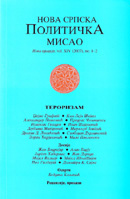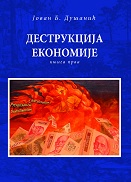| NSPM in English | |||
Nobel Peace Prize for War |
 |
 |
 |
| петак, 12. децембар 2008. | |
|
Not so in the case of Mr. Ahtisaari, who, while officially being celebrated for a long career mediating global conflicts, is best and most recently known for his disastrous role in arranging Kosovo’s independence. It was this independence, declared in clear violation of international law and despite the strong objections of democratic UN member state Serbia, which was effectively divided, that contributed to the recent conflict between Russia and Georgia over Abkhazia and South Ossetia. Those two separatist enclaves won Russia’s recognition as independent states and are now probably lost to Georgia for a long time, if not forever. This outcome was easy to predict, and indeed was predicted by many both inside and outside the Bush administration, myself included. Moscow was quite explicit in saying that the unilateral independence of Kosovo without Serbian and UN Security Council consent would inevitably create a precedent for Abkhazia and South Ossetia, and Georgia was equally explicit in making clear that it would not tolerate the two territories moving further and further from its control. Mr. Ahtisaari cannot escape the blame for the conflict in the Caucasus in August. He was appointed in 2005 by then-UN Secretary General Kofi Annan to lead Kosovo’s “final status” negotiations, but never made the slightest pretense of being an impartial mediator. From the beginning, he made clear to the Serbians and Kosovar Albanians alike that the only conceivable outcome of the talks was independence for Kosovo. That left little incentive for the parties, particularly for the Kosovars, to compromise, and effectively precluded any negotiated solution. Ahtisaari did not seriously attempt to explore a possible partition of Kosovo, an extension of the timetable for achieving independence, or anything that would have given the democratically-elected government in Belgrade a way to defend an agreement to its deeply skeptical body politic. The results of Ahtisaari’s work are well-known. First, Kosovo unilaterally declared its independence in violation of UN Resolution 1244 which had ended the war between NATO and Yugoslavia (and which Ahtisaari himself helped to negotiate at the time). Then, war broke out between Russia and Georgia, leading to the inevitable defeat of the government of Mikheil Saakashvili, the United States’s closest ally in the post-Soviet space. And the fighting pushed the United States and Russia toward a new confrontation at a moment when Washington needs Russian cooperation in a number of vital areas, including Iran and Afghanistan. The Bush administration openly embraced Ahtisaari as an advocate for the U.S. position during the process he led—and Serbians and Russians alike saw him as such. Russian officials claim that on several occasions when they tried to encourage Ahtisaari to offer more to Belgrade, he suggested that they raise their proposals with Washington first. During the cold war, “Finlandization” referred to the willingness of Finland and other small countries on the Soviet Union’s periphery to take foreign-policy guidance from their Big Brother to the east, while protecting their domestic independence. Reverse Finlandization emerged quickly after the collapse of the USSR, when Martti Ahtisaari, elected Finnish president in 1994, became a poster boy for former-Soviet client states lining up to swear fealty to the United States. His dismissive attitude to Russian concerns is supported by today’s Finnish public opinion, which is the most anti-Russian in Europe (with 62 percent of Finns polled by Gallup in November 2008 having a “very negative” or “fairly negative” view of Russia) after—guess?—Kosovo (73 percent fairly or very negative). Remarkably, Finns have an even more negative view of Moscow than Poles and Lithuanians, who have much more legitimate grievances vis-à-vis Moscow. Apparently, voluntarily choosing to cooperate with the USSR makes one more hostile to its successors than being forced into submission and waging courageous resistance. There was a concert in Oslo today paying tribute to Mr. Ahtisaari. I assume they did not play a Russian military march—but that’s what Georgians had to hear because of Mr. Ahtisaari’s failed mediation over Kosovo. And a lesson for American foreign policy: America needs thoughtful friends, not sycophants who often create more problems than they solve. Dimitri K. Simes is the president of The Nixon Center and publisher of The National Interest. 11.12.2008 The National Interest |
Остали чланци у рубрици
- Playing With Fire in Ukraine
- Kosovo as a res extra commercium and the alchemy of colonization
- The Balkans XX years after NATO aggression: the case of the Republic of Srpska – past, present and future
- Из архиве - Remarks Before the Foreign Affairs Committee of the European Parliament
- Dysfunction in the Balkans - Can the Post-Yugoslav Settlement Survive?
- Serbia’s latest would-be savior is a modernizer, a strongman - or both
- Why the Ukraine Crisis Is the West’s Fault
- The Ghosts of World War I Circle over Ukraine
- Nato's action plan in Ukraine is right out of Dr Strangelove
- Why Yanukovych Said No to Europe

.jpg)








 There have been more embarrassing selections for the Nobel Peace Prize than this year’s choice, former–Finnish President Martti Ahtisaari, but not more illogical ones. Whatever one may say about North Vietnamese communist leader Lê Dúc Tho or PLO Chairman Yasser Arafat, they received the Nobel Peace Prize for real accomplishments, or at least accomplishments that looked real at the time: the Paris Peace Accords Tho negotiated with Henry Kissinger in 1973 and the Oslo Accords that Arafat negotiated with Yitzhak Rabin in 1993. Neither of these agreements lasted long and blood and treachery soon followed both. But at the time the prize was awarded, there was at a minimum appearance of a major diplomatic achievement.
There have been more embarrassing selections for the Nobel Peace Prize than this year’s choice, former–Finnish President Martti Ahtisaari, but not more illogical ones. Whatever one may say about North Vietnamese communist leader Lê Dúc Tho or PLO Chairman Yasser Arafat, they received the Nobel Peace Prize for real accomplishments, or at least accomplishments that looked real at the time: the Paris Peace Accords Tho negotiated with Henry Kissinger in 1973 and the Oslo Accords that Arafat negotiated with Yitzhak Rabin in 1993. Neither of these agreements lasted long and blood and treachery soon followed both. But at the time the prize was awarded, there was at a minimum appearance of a major diplomatic achievement.











